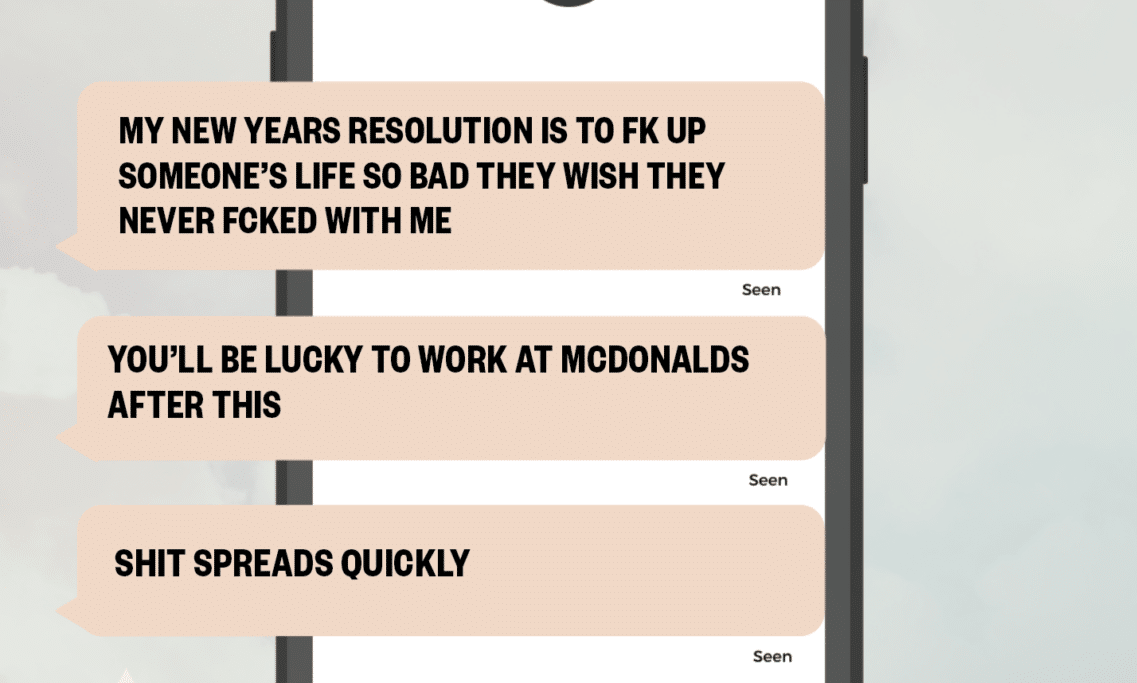By Norma Buster, our Client Relations Manager and former client of C.A. Goldberg, PLLC
Here’s the thing about the court system: unless you have a lawyer or experienced advocate guiding you through it, no one tells you what to expect.
Late at night on January 1, 2015, my parents and I sat in our local precinct in Nutley, New Jersey, two months before I’d finally find my lawyer, Carrie Goldberg. My ex-boyfriend of two years had been stalking me for months, and now he had taken to Twitter, threatening to release my naked pictures. He wrote:
My new years resolution is to f*ck up someone’s life so bad they wish they never f*cked with me
You’ll be lucky to work at McDonalds after this
Shit spreads quickly
He had been taunting me for months. Like many victims who seek help, I had printouts of threatening texts and tweets with me, not knowing what else to do. We were desperate for help.
The police were unsure what to do, but they put me on the phone with my town judge for a Temporary Restraining Order (TRO). After briefly explaining the situation to her, the officer handed the phone to me. “Listen,” the judge started, not sounding particularly pleased to be speaking to me this late at night, “I’ll grant you the temporary restraining order, but I don’t know that this will help.”
The officer told me I’d get something in the mail with a court date, and I nodded, not really understanding what all of this meant. I just knew my ex couldn’t contact me anymore, at least for a while. A small victory.
My ex had to be served with the TRO by local police for it to go into effect. I received a letter with a court date in Essex County Family Court, where a judge would decide whether to grant a Final Restraining Order (FRO).
And for 26 days, the length of the TRO, I had a break from him. No texts. No threats. He even stayed away from the gym we were both members of. For almost 4 weeks, I could breathe again. I could step outside my house without needing to look around for him (although the habit would stick for years; especially when I’m back in Jersey, I still find myself scanning my surroundings constantly, mistaking strangers for him, thinking I’d seen his face – I came to realize this hyper-vigilance was a classic sign of PTSD).
I was not willing to give up the peace of mind that the TRO had given me, and I knew that I needed that Final Restraining Order.
On January 28, 2015, the ‘return’ court date I received a letter in the mail for, I walked into family court. I was going into the unknown. I didn’t even understand at age 19, exactly, that I was going into family court, as opposed to criminal or civil. I thought I was all prepared — I had a manila envelope filled with printouts of his threatening messages, including ones from early January with my explicit photos he sent to me just before he was served with the TRO, taunting that he still had them.
But while I showed up armed with my envelope of print outs, he brought with him a far more potent weapon — an attorney.
And his attorney grilled me. “Isn’t it true that you clicked on your ex’s Soundcloud account 29 times within two days in January of 2015?” he demanded.
What?! What was he even talking about? My eyebrows knitted together, my frustration obvious to everyone in the silent courtroom. “No.” I shook my head. “That’s not true.”
But it didn’t matter what my answers were; his questions were so matter-of-fact that they were basically accusations, and coming from a lawyer they felt like they had weight. When it was my turn to speak, I told the judge I had screenshots for evidence. I handed them to him, feeling humiliated that I had to hand over images of me in a bra and panties to a judge, and even worse when he passed them to my ex’s attorney. Was this really necessary? Even those pictures?
By the end of the hearing, the judge declared he hadn’t seen enough evidence that I was in danger. I sighed, exhausted and beat down after a humiliating loss in court.
I wasn’t going to be helped just because I was a victim of a crime. My ex was so clearly in the wrong here; he was obsessed and everyone knew it, yet in front of the judge, his attorney made me look like I was the one fixated on him.
Why was my ex fighting so hard? He could’ve just agreed to stay away from me–instead, his dad hired a lawyer to get him out of it. I couldn’t get my head around it because I didn’t have the experience that I now have of seeing how the mind of a stalker works. I didn’t realize then the entitlement felt by many stalkers; that they mistakenly feel they have a right to their victim’s attention. It becomes a power struggle over the victim’s autonomy. This was supposed to be it. But it wasn’t over.
More importantly, why was his lawyer fighting so hard for my abuser to retain the right to harass and abuse me? It turns out there are plenty of unscrupulous lawyers who leave their morality at the door and who will do whatever their client tells them to do and believe whatever their client says. This lawyer didn’t care that there was a scared nineteen year old (me!) who was in real danger. I was the foe and they wanted a win. The lawyer ignored how unhinged his client was and didn’t care that by clobbering me at this stage (in the family court order of protection) would make his client feel licensed to access me and escalate the abuse. Had the lawyer just consented to the order of protection and counseled his client wisely, he would have spared both me and his client from the extreme escalation ahead that threatened both our lives and futures.
There was nothing exceptional about my ex’s lawyer. The lawyer was hired to defeat me and he did it effortlessly. I walked out of court totally stripped of all the protections and safeties I’d fought so hard for and was trying to continue to secure. I never stood a chance against a professional who knew exactly how the system worked.
Over the next month, my ex didn’t contact me directly but he’d still show up at the gym late at night when he knew I was there. I constantly had to keep my eyes peeled, going about my daily life was like walking through a field of land mines where he could pop up at any time. He took up guitar playing and was still posting songs he had written about me, supposedly, though I never listened. One night a gym manager frantically warned me to stay in the women’s locker room, because my ex had shown up with a guitar, seemingly looking for me. I avoided a serenade, but I was constantly being approached by fellow gym members, acquaintances and strangers, asking if I was okay because my ex had ranted to them about me.
Then, on February 25, 2015, he posted my naked pictures online (you can read more about my experience in ELLE). He committed several crimes, including violating New Jersey’s law criminalizing nonconsensual pornography. But the criminal investigation to prove it was him, which would involve subpoenaing the platforms he had used to trace the impersonating accounts created to him, was only initiated when my attorney at C.A. Goldberg escalated the case to a specific prosecutor with experience in tech and domestic violence.
I couldn’t help but feel that it needn’t have come to this. The temporary restraining order had worked. If I had a final restraining order in place, any contact—online or third party included—would’ve been a criminal violation. Maybe it would’ve deterred him.
After I met Carrie Goldberg and she helped get the criminal process going, she helped direct me to Essex County Family Court in Newark, since my town judge had denied me a second TRO after my ex released the pictures. The fact that my ex and his lawyer defeated me in my earlier FRO influenced the town judge and made her think there was no merit to my request. She said I’d already been denied the FRO and that gave her tunnel vision — she refused to consider the extreme escalation that had transpired in the mean time. I would face a judge by myself and ask for a TRO. To my relief, it was a relatively quick and easy process, and I was granted it that day.
At the next hearing, I came prepared with representation that Carrie helped me find in New Jersey through Partners for Women and Justice, folders of evidence, and a witness. [Luckily, C. A. Goldberg now has attorneys on staff that practice in New Jersey!] My lawyer had a list of stalking and harassing actions committed by my ex, and she met with his attorney before we faced the judge to go through it with him. My ex would admit to and agree to all of it, except for the nonconsensual porn. I was elated, knowing a criminal investigation for the pictures was already underway, so I didn’t need his confession in family court that day. I was granted an FRO, which meant my ex has to stay away from me forever and can’t ever contact me again, in oral, written, personal, or electronic form. He can’t ever go to my home, workplace, or gym in New Jersey. No telling others to contact me on his behalf. He can never own a weapon. And he had to delete any photos he had of me in his possession—clothed or not. If he violates the FRO, it will be a criminal violation and he faces arrest.
I’m incredibly grateful for the outcome. But knowing what I do now, I would have gone straight to an attorney rather than trying to represent myself. It would’ve saved me from the humiliation, defeat, and additional trauma that I had to deal with alone. But like many, I simply didn’t know I should have an attorney representing me. And I now understand that losing a restraining order or order of protection hearing the first time can make it so much harder to secure an order in the future.
It’s unfortunate how difficult it can be to navigate the legal system when you’re on your own, especially when you’re in danger. I know firsthand. I also now know that you don’t have to go through it alone.
We’re here to help you through the process; our attorneys have helped obtain 100 Orders of Protection for our clients. If you think you may be in need of an Order of Protection, get in touch here.




